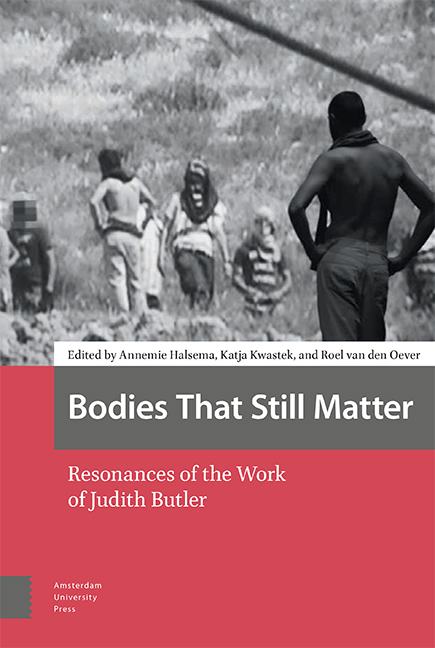Dancing the Image: Complicity, Responsibility and Spectatorship
Published online by Cambridge University Press: 27 May 2021
Summary
Abstract
This essay offers a close reading of Archive (2014), an hour-long performance by Israeli dancer and choreographer Arkadi Zaides, during which the artist conducts a corporeal dialogue with audio-visual documentation of human rights violations in the occupied Palestinian territories. I will point to the ways in which the work's atypical engagement with the mediation of violence resonates Judith Butler's thought on opaque subjectivities, collective responsibility, risk and complicity. I will further place Butler's call for ethical responsibility in dialogue with current debates on the production, circulation, and reception of images of violence, both in the specific context of the Israeli-Palestinian conflict, and in relation to more general conceptualizations of spectatorship.
Keywords: collective responsibility, opaque subjectivity, violence, spectatorship, counter-visual strategies, Israel-Palestine
In Giving an Account of Oneself (2005) as well as in Precarious Life (2004), Judith Butler theorizes the notions of ethical responsibility and risk in relation to a subject who is not self-grounding, and who can never give a coherent and final account of herself. Butler's understanding of subjects as fundamentally vulnerable, fundamentally “given over” to each other's mercy, forms the basis of what she calls “collective responsibility” (2004, 29). Prevalent responses to injury, such as rage or guilt (“bad conscience”), work against such responsibility as they withdraw the subject into narcissism and foreclose the primary relation to alterity (Butler 2004, 29; 2005, 99-100). As an alternative, Butler offers vulnerability to (and risk of) loss as primary tools for “living otherwise” (2005, 100). “Mindfulness of this vulnerability,” Butler argues, “can become the basis of claims for non-military political solutions, just as denial of this vulnerability through a[n institutionalized] fantasy of mastery … can fuel the instruments of war” (2004, 29). She ends her contemplation on the conditions of accountability with the oft-quoted following words:
Perhaps most importantly, we must recognize that ethics requires us to risk ourselves precisely at moments of unknowingness, when what forms us diverges from what lies before us, when our willingness to become undone in relation to others constitutes our chance of becoming human.
- Type
- Chapter
- Information
- Bodies That Still MatterResonances of the Work of Judith Butler, pp. 113 - 126Publisher: Amsterdam University PressPrint publication year: 2021

